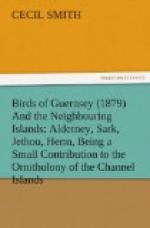No doubt the Ornithology of the Channel Islands, as is the case in many counties of England, has been considerably changed by drainage works, improved cultivation, and road-making; much alteration of this sort I can see has taken place during the thirty years which I have known the Islands as an occasional visitor. But Mr. MacCulloch, who has been resident in the Islands for a much longer period—in fact, he has told me nearly double—has very kindly supplied me with the following very interesting note on the various changes which have taken place in Guernsey during the long period he has lived in that island; he says, “I can well recollect the cutting of most of the main roads, and the improvement, still going on, of the smaller ones. It was about the beginning of this century that the works for reclaiming the Braye du Valle were undertaken; before that time the Clos du Valle[2] was separated from the mainland by an arm of the sea, left dry at low water, extending from St. Samson’s to the Vale Church. This was bordered by salt marshes only, covered occasionally at spring tides by the sea, some of which extended pretty far inland. The meadows adjoining were very imperfectly drained, as indeed some still are, and covered with reeds and rushes, forming excellent shelter for many species of aquatic birds. Now, as you know, by far the greater part of the land is well cultivated and thickly covered with habitations. The old roads were everywhere enclosed between high hedges, on which were planted rows of elms; and the same kind of hedge divided the fields and tenements. Every house, too, in those days had its orchard, cider being then universally drunk; and the hill-sides and cliffs were covered with furze brakes, as in all country houses they baked their own bread and required the furze for fuel. Now all that is changed. The meadows are drained and planted with brocoli for the early London market, to be replaced by a crop of potatoes at the end of the summer. The trees are cut down to let in the sun. Since the people have taken to gin-drinking, cider is out of favour and the orchards destroyed. The hedges are levelled to gain a few perches of ground, and replaced in many places by stone walls; the furze brakes rooted up, and the whole aspect and nature of the country changed. Is it to be wondered at that those kinds of birds that love shelter and quiet have deserted us? You know, too, how every bird—from the Wren to the Eagle—is popped at as soon as it shows itself, in places where there are no game laws and every man allowed to carry a gun.”
This interesting description of the changes—agricultural and otherwise—which have taken place in the Islands, especially Guernsey, during the last fifty or sixty years (for which I have to offer Mr. MacCulloch my best thanks), gives a very good general idea of many of the alterations that have taken place in the face of the country during the period above mentioned; but does not by any means exhaust them,




